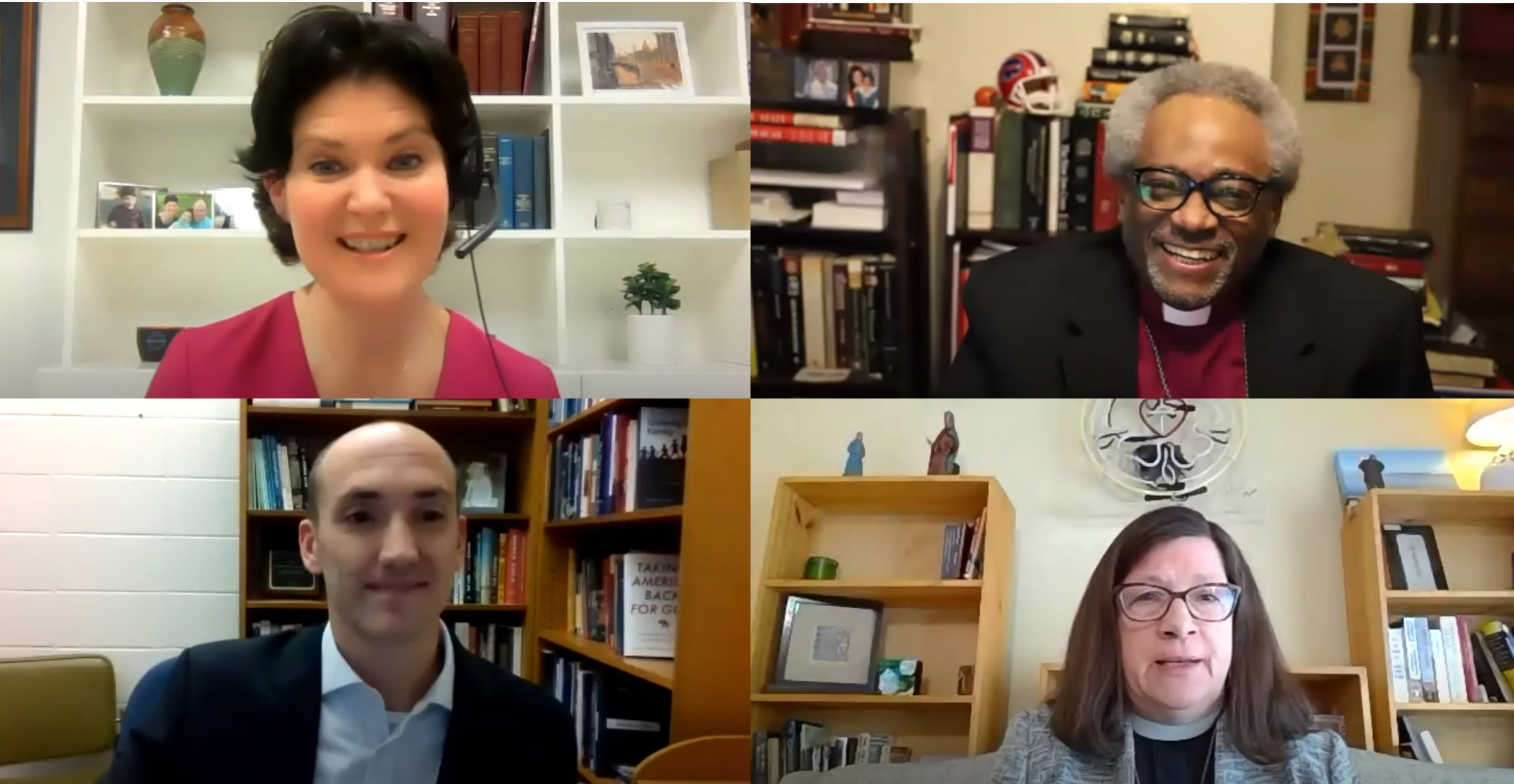Standing up and speaking out against Christian nationalism
How can we respond when we see our faith and democracy under siege?

By Cherilyn Crowe and Jaziah Masters
The world watched in horror as rioters stormed the U.S. Capitol on January 6, some cloaking their destructive acts in Christian imagery. In the aftermath, BJC brought together faith leaders and experts for an exploration of how we are identifying and responding to the dangers of Christian nationalism in the wake of the insurrection.
“Christian nationalism is not new,” said BJC Executive Director Amanda Tyler, who moderated the event. “But the frequency of violent acts inspired by Christian nationalism and a resurgence in attempts to legislate and govern from a position infused with Christian nationalism has been on a dramatic uptick in recent years.”
The nationwide webinar brought together The Most Rev. Michael Curry, Presiding Bishop and Primate of The Episcopal Church; The Rev. Elizabeth A. Eaton, Presiding Bishop of the Evangelical Lutheran Church in America; and Dr. Andrew L. Whitehead, Associate Professor of Sociology at Indiana University Purdue University-Indianapolis.
Tyler said Christians bear a special responsibility to understand and root out Christian nationalism, and not just in its most extreme forms – we have to recognize it “in the deeply ingrained manifestations in our culture, in our churches and ourselves.”
Christian nationalism is not new. But the frequency of violent acts inspired by Christian nationalism and a resurgence in attempts to legislate and govern from a position infused with Christian nationalism has been on a dramatic uptick in recent years.
Dr. Whitehead provided an overview of how researchers identify Christian nationalism. He also dispelled the myth that it is confined to one particular social, demographic or even religious tradition — rather, it’s pervasive across all segments of society.
On the surface, Christian nationalism seeks to merge “Christianity” with American civic life, but it’s a type of “Christianity” that carries assumptions about nativism, white supremacy, patriarchy, authoritarianism and militarism, according to Dr. Whitehead.
“The ‘Christianity’ in Christian nationalism, to a certain population, means ‘people like us,’ and the ‘people like us’ are generally white, native born and culturally Christian,” he said.
Adherence to and support of Christian nationalism shapes Americans’ behaviors and attitudes on a variety of topics, including racial injustice, immigration and the COVID-19 pandemic.
Whitehead noted the overlap between white supremacy and racial subjugation in the research, including how Christian nationalists often believe police brutality against Black Americans is exaggerated by the media.
“Christian nationalism, for white Americans, in many ways, blinds them or is part of helping them blind themselves to believing that there isn’t inequality in the U.S.”
Christian nationalism, for white Americans, in many ways, blinds them or is part of helping them blind themselves to believing that there isn’t inequality in the U.S.
Religious leaders responded to the research, and they shared a theological perspective on the political ideology.
“Since the beginning of the Christian movement, one of the earliest confessions of faith was ‘Jesus is Lord,’ which was seen as a direct threat to — at that time — the Roman Empire,” said Bishop Elizabeth Eaton.
“Christians faced persecution because they declared that their primary allegiance was not to any temporal or secular government, but it was to the Lord, so that’s a primary problem in all this.”
Bishop Michael Curry pointed out that there is a consistent pattern when you see Christianity go astray, such as by supporting slavery, being comfortable with apartheid or being silent the midst of evil: Each time that happens, he said the teachings of Jesus get moved aside and suppressed for “a broad, ambiguous Christ-figure who can be adapted to any cultural context.”
Curry said we’ve all seen the dangerous kind of Christian nationalism before.
“I’m 67 years old — been Black all those 67 years — and I have known since childhood that the [Ku Klux] Klan professed to be Christian,” he said.
“We grew up knowing that, so we knew there was an unholy conflation of Christianity and white supremacy, and it was often tinged with Americanism.”
As Eaton pointed out, being a patriotic American is different from embracing Christian nationalism, and no one is condemning patriotism.
“Christian nationalism conflates our allegiance and our understanding and even our relationship with God with a particular secular state — in this case, the United States — to be a ‘Christian country,’” she said. If you hold that view, she explained, you would think that someone cannot — by that definition — be a “real American” unless that person is a certain kind of Christian.
Christians faced persecution [in the early church] because they declared that their primary allegiance was not to any temporal or secular government, but it was to the Lord.
When we see our nation as the best or “God’s favorite,” that borders on blasphemy and idolatry, according to Curry.
“That kind of nationalism is dangerous to civic health, it is dangerous to the health of Christianity,” he said. “When it gets going, it means if we’re ‘God’s favorite’ and we’re the ‘chosen ones’ and we’re in charge, then everybody else is secondary,” he said.
Panelists pointed to the history of our country, including how the Bible was used to justify slavery and how Europeans treated non-Christians in the Americas. Under the Doctrine of Discovery, the Spanish, English and French saw areas of land without Christians on it as available to Christians for the taking, and they took land from the Native Americans who lived on it.
Slave owners in Colonial America debated whether they should baptize their slaves and teach them about Christianity. In Europe at the time, Christians generally couldn’t be enslaved. The Bishop of London settled the issue by declaring that baptism is totally a spiritual matter and has no effect on a person’s civil standing.
“You see Christianity was right there being perverted to accommodate itself to what folk wanted to do to other folk — like Doctrine of Discovery,” said Curry.
“I think, ‘What a painful anecdote from history,’ but a perfect illustration of just how Christian nationalism can pervert our faith,” Tyler said.
I am 67 years old — been Black all those 67 years — and I have known since childhood that the [Ku Klux] Klan professed to be Christian. … [W]e knew there was an unholy conflation of Christianity and white supremacy, and it was often tinged with Americanism.
Tyler, Whitehead, Eaton and Curry discussed ways to stand against the dangerous ideology, including countering negative perversions of Christianity with positive examples.
Curry offered three steps, including re-centering Christianity on the teachings and example of Jesus, calling on our common humanity, and rebuilding relationships between people across differences of politics, race and religion.
“We are all children of God made in God’s image and likeness, and that means we’re brothers, sisters — we are related to each other,” he said.
Curry said we also have to rebuild relationships intentionally between people across differences.
“Everybody who knows somebody who’s different than they are: Get to know them, spend some time with them, let that become a personal value for your life, and then maybe we can begin to chip away,” he charged.
“Lutherans talk a lot about grace,” said Eaton. “I think it’s time for us to understand it and live it. God’s grace is for everyone, not just for certain people.”
“The reality is Christianity has been held hostage,” said Curry. “And we must reclaim it.”
Curry said Christian people must stand with those who have nobody to stand with them.
“We must speak up and show up when something happens against our Jewish brothers and sisters, against our Muslim, our Sikh brothers and sisters,” he said.
“We must stand publicly for things that don’t give us any advantage — that is to be spokespersons for children in this society who are hungry right now, to advocate in the public sphere for what is just and kind and decent and humane.”
Curry said people have to see the shift before they believe it, and it’s got to happen consistently from those of us who are Christians and Christian leaders.
“It’s that simple,” declared Curry, sharing that people need to see a different version of Christianity than the perverted version that Christian nationalism showcases, and we have to reclaim the faith.
“We’ve got to speak up and stand up.”
This article appeared in the Spring 2021 edition of Report from the Capital. You can watch the webinar at this link. Tead the entire magazine as a PDF or as a digital flip-through edition.
Featured
Resources
Join us in standing against Christian nationalism.
In 2019, BJC joined with other ecumenical leaders to create the Christians Against Christian Nationalism statement.
As Christians, we must speak in one voice condemning Christian nationalism as a distortion of the gospel of Jesus and a threat to American democracy. All Christians are welcome to join the 22,000+ others who have signed the statement.
Visit ChristiansAgainstChristianNationalism.org to sign the statement and access additional resources, including:
- A podcast series and small group discussion guide for deeper conversation.
- A collection of webinars, including the one in this article and one hosted by Fellowship Southwest on confronting the ideology.
- Digital and printable resources to educate yourself and share with others in your community.





